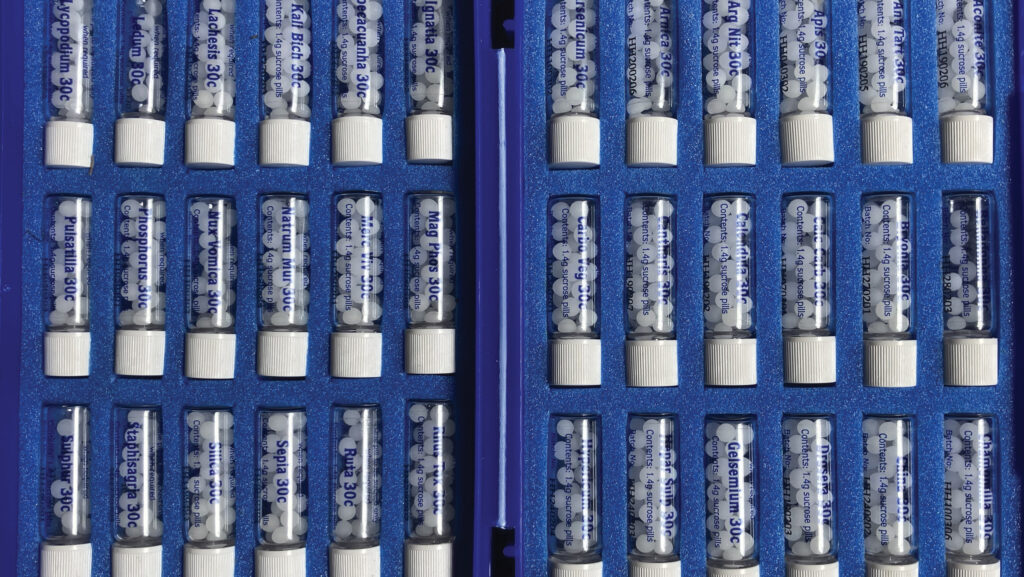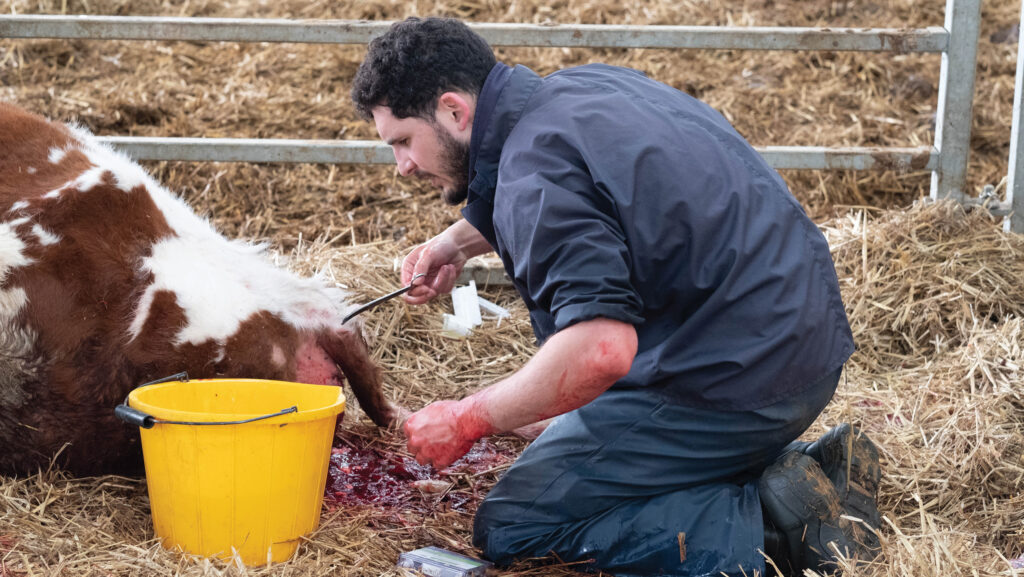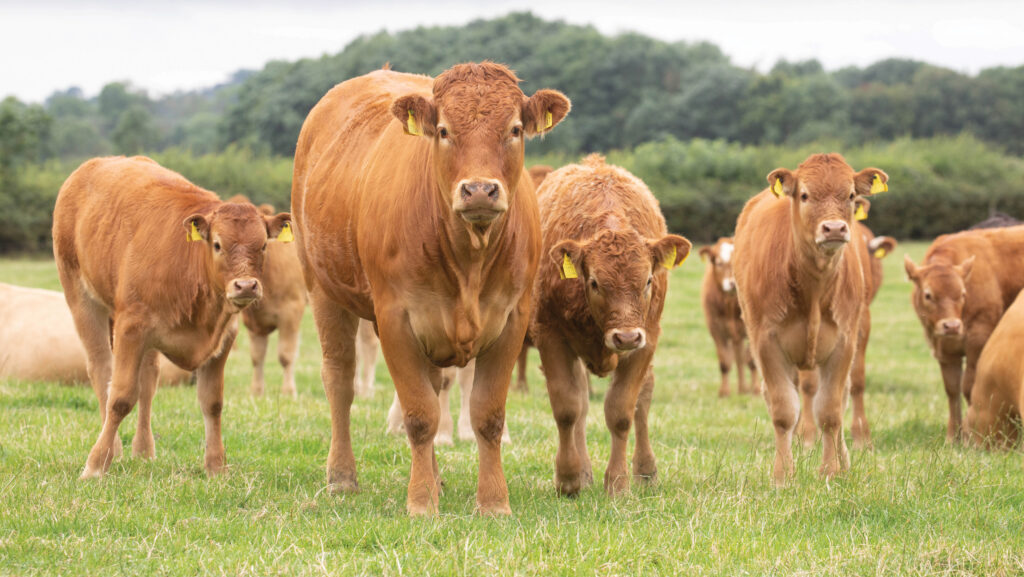How homeopathy can prevent and reduce livestock disease
 © MAG/Emma Gillard
© MAG/Emma Gillard Integrating homeopathic and preventative protocols into livestock systems can avoid up to 80% of common health problems, according to veterinary surgeon and homeopathic vet Chris Aukland.
“Disease doesn’t just happen,” he says. “It is a process that builds up overtime, and when tipped over the threshold goes into crisis, where disease symptoms show.”
Stress is often the pre-cursor of disease, making animals prone to infection, he adds.
See also: How soil and crop can contribute to ruminant nutrition
Homeopathic stress remedies
Every farm has unavoidable stress events such as livestock transportation, mixing of groups, new situations, birth, weaning, weather or nutritional change.
“Even a change in routine, handling and farmer stress can impact livestock stress levels,” notes Chris.
By reducing stress and focusing on the root cause of disease, rather than addressing symptoms, homeopathy can support animal health.
Homeopathy is a form of complementary medicine in which ailments are treated by small doses of natural substances.
This works on the principle of stimulating the body’s regulatory mechanisms, including the immune system, to promote self-healing.
This is part of a natural process that assists the animal to regain health, and supports development.
The 80/20 approach
Chris points to the 80/20 approach, which – as a rough guide – sees 20 key remedies, when used well, prevent or reduce 80% of common livestock health problems.
Matching specific homeopathic remedies to certain events can reduce stress levels.
“We know complementary medicines such as homeopathy can work. Farmer experiences cannot be ignored,” he points out.
Below is a selection of useful remedies.

© Tim Scrivener
Birth and fertility
Homeopathy can be used to support livestock reproductive health, including labour and fertility cycles.
- Arnica Assists with trauma, bruising, and fatigue after birth, beneficial for both mother and newborn.
- Caulophyllum Useful when labour involves weak or ineffectual contractions and helps reduce risk of retained placenta.
- Pulsatilla Used to support first-time mothers.
- Sepia Given to regulate hormonal cycles and support reproductive balance.
- Staphysagria A pre-breeding remedy.
Digestion
Remedies can be given to help the digestive system recover after exposure to dietary changes such as spring grass, new rations, or weaning.
- Nux vomica Used for digestive issues caused by diet change, overindulgence or toxicity.
- Pulsatilla Well-suited to youngstock reacting to rich feeds.
- Lycopodium For animals with poor appetite or bloating.
- Arsenicum Best for diarrhoea or scours, especially when linked to toxicity, spoiled feed, or contamination.
Growth and development
Young or underdeveloped animals may benefit from remedies that encourage growth and immunity.
- Calc carb Helps poor or slow developers, particularly with mobility and bone development.
- Calc phos Supports growth and development of fast-growing animals that seem “tall but thin”.
- Lycopodium For animals that struggle to finish feed and are prone to bloat.
- Silica Strengthens weak or fussy feeders with low vitality.
Emotional stress and separation
Emotional distress from weaning, handling, or environmental changes can manifest in fear and panic.
- Aconite For sudden fright, shock, or panic, such as weather events or dehorning.
- Arg nit Supports animals with fear and anxiety.
- Arsenicum Used to help with deep fear and restlessness.
- Ignatia For emotional fear, grief and panic, such as weaning or separation anxiety.
- Pulsatilla Especially beneficial for animals who need company or struggle during weaning.
The AAA combination (aconite, arsenicum, arg nit) is a powerful stress remedy combination.
Physical injury
Prompt remedy use for physical injuries can speed up healing and reduce complications.
- Arnica Used after trauma, bruising, or fatigue.
- Hypericum Remedy for nerve injuries, tail or claw trauma, wounds, bites or stings, and for treating downer cows.
Inflammation
Inflammatory conditions can manifest as infections. Remedies used to reduce the impacts include:
- Belladonna For inflammation, heat stress, and conditions ending in “-itis” (for example, mastitis)
- Hepar sulph Supports the body in dealing with abscesses, joint ill and other infections
- Pyrogen Used in cases of retained placenta, foot-rot, or joint ill.
Parasites, ticks and flies
Pest pressure can cause stress and secondary infections. Certain remedies are given to improve animal resilience:
- Sulphur Boosts natural resistance to parasites
- Ledum To help resilience to biting insects and to treat bites, stings and puncture wounds
- Staphysagria Given to make animals less attractive to biting pests, so useful in high-fly environments.
Temperature and weather
Sudden weather shifts can lead to illness, especially in young or weakened animals.
- Aconite For animals chilled by cold wind or sudden weather change.
- Belladonna Used to treat heat stroke and sun exposure.
Source: Whole Health Agriculture

© Tim Scrivener
Administering remedies
Jacqueline Pearce-Dickens, co-founder and chief executive of Whole Health Agriculture, recommends putting the remedy into effect “as the change is about to happen, or as it has just happened”.
“To get effective results, it is important to use remedies correctly. We have a Learning Centre [learning.wholehealthag.org] dedicated to training vets and farmers on how to do this,” she says.
Remedies can be diluted in water and the solution sprayed on mucous membranes, such as the nose, to treat individual animals or poured into a water trough to treat a herd.
“The best medicine is integrated. This is not about replacing your vet. It is about enhancing good husbandry to prevent escalation of potential problems,” she says.
If in doubt about animal health, consult your farm vet.
Farmer experiences using homeopathy
For Irish dairy farmer Lisa Anderson, homeopathy has resulted in a clear reduction in overall herd stress.
She uses the AAA combination (aconite, arsenicum, arg nit) when taking animals to market, to combat fear, anxiety and suspicion.
She adds ignatia to this combination during weaning and separation from the herd, and for first-time heifers coming into the parlour. “They come in unbelievably calm,” she says.
Pulsatilla, sepia or caulophyllum have helped eliminate retained placentas. Lisa regularly uses nux vomica when animals are grazing in rich pasture, or any feed change for cows and calves.
Every week, she puts weather-related remedies in water troughs, to reduce the impacts of the cold, wind and rain on her coastal farm in Donegal.
“Observation is key. You must be vigilant and know when the vital force of the animals is out of sync and what’s not normal to that individual animal.
Then, you can choose remedies to match the symptoms, treating “like with like,” she says.
“Homeopathy found me,” explains Irish organic beef farmer John Thompson, who fattens 70 cattle each year.
When he was struggling to cure an animal with a bad case of scour, he came across a homeopathic vet who provided him with a successful treatment.
From then, he delved into the world of homeopathy and regularly uses remedies, including anti-parasitic remedies such as sulphur, which come with no withdrawals.
Irish dairy farmer Paul O’Brien milks 85 spring-calving cows. He works closely with both his conventional and homeopathic vets.
“The two go hand-in-hand, aiming to make livestock less susceptible to disease. That’s where homeopathy comes in – it’s all about healthy animals.”
Homeopathic pharmacies
In the UK, homeopathic pharmacies follow strict regulatory guidelines to ensure high-quality remedies. Helios, Ainsworth and Freemans are among the companies selling homeopathy kits.
